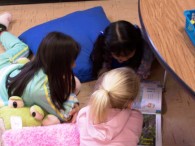One of the decisions slaves in the American South made was whether and/or how to resist the power of the slaveholder. Learning to read was one of those decisions some were in a position to make.
The risk for slaves in the South was in the law and also at the whim of the slaveholder.
From the Statute Laws of Georgia for 1845 concerning educating negroes, under Section II, Minor Offences. “Punishment for teaching slaves or free persons of color to read. If any slave, negro, or free person of color, or any white person, shall teach any other slave, negro or free person of color, to read or write either written or printed characters, the said free person of color or slave shall be punished by fine and whipping, or fine or whipping, at the direction of the court.”
From “Slavery by Ruby Lorraine Radford,” image 317
Slaveholders had free rein to render harsher punishment to slaves who learned to read:
. . . ‘Ole Marse’ wuz sho hard about that. He said ‘Niggers’was made by de good Lord to work, and onct when my Uncle stole a book and was a trying to learn how to read and write, Marse Jasper had the white doctor take off my Uncle’s fo’ finger right down to de ‘fust jint’. Marster said he fixed dat darky as a sign fo de res uv ‘em!
From “Henry Nix – ex-slave interviewed,” image 144
While all children are currently allowed, in fact forced, to learn to ‘read,’ the definition of the reading they want teachers to teach is worth noting: current dominating trend defines reading as phonics, word recognition, fluency, information recall/retell and vocabulary as measured on standardized out of context test items. On the other hand, we can teach reading for meaning, for questioning, for critical and expanded thinking, aka synthesis. The latter is reading that would lead to challenges to status quo, advocacy, liberation. So in a less obvious way, many of the schools that serve kids from predominantly financially insecure populations, are pushed toward limited definitions of reading that keeps them oppressed.
Every time a teacher guides a student to ask questions, make inferences, find meaning, we are teaching the kind of reading with potential to transform over merely perform. We also open membership into an ancient tradition of scholarship, inquiry and critical thought. We offer a life with opening possibilities.
What are we risking? What decisions can we make?
Boldt, Katie. bookbuddies4.jpg. . Pics4Learning. 11 Apr 2015 <http://pics.tech4learning.com>

